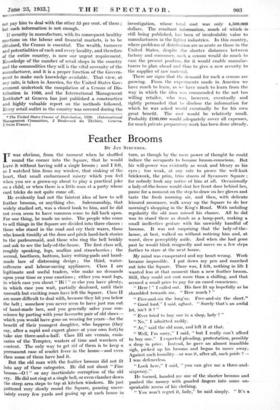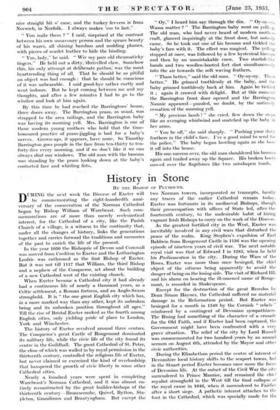Feather Brooms BY JAN STRUTHER.
IT was obvious, from the moment when he shuffled round the corner into the Square, that he would leave it without having sold a single broom ; and I felt, as I watched him from my window, that sinking of the heart, that small embarrassed misery 'which you feel when you see a grown-up about to play a practical joke on a child, or when there is a little man at a party whose card tricks do not quite come off.
He evidently had not the faintest idea of how to sell feather brooms, or anything else. Salesmanship, that widely studied art, was a closed book to him, and he did not even seem to have common sense to fall back upon. For one thing, he made no noise. The people who come to sell things in the Square are divided into three classes : those who stand in the road and cry their wares, those who knock timidly at the door and pitch hard-luck stories to the parlourmaid, and those who ring the bell briskly and ask to see the lady-of-the-house. The first class sell, roughly speaking, logs, muffins and strawberries ; the second, bootlaces, buttons, hairy writing-pads and hand- made lace of distressing design ; the third, water- softeners- and labour-saving appliances. Class I are legitimate and useful traders, who make no demands upon your time or your emotions ; either you want logs, in which case you shout ," Hi ! " or else you have plenty, in which case you wait, partially deafened, until their uncouth but exciting roars have left the Square. Class II are more difficult to deal with, because they hit you below the belt ; somehow you never seem to have just run out of hand-made lace, and you generally salve your con- science by parting with your favourite pair of old shoes— which you would have gone on wearing for years—for the benefit of their youngest daughter, who happens (they say, after a rapid and expert glance at your own feet) to take size three-and-a-half. Class III are vermin, emis- saries of the Tempter, wasters of time and wreckers of content. The only way to get rid of them is to keep a permanent case of scarlet fever in the house—and even then some of them have had it.
But the old man with the feather brooms did not fit into any of these categories. He did not shout " Fine broom-0 I " or any inarticulate corruption of the old cry. He did not ring at a single bell, or even clamber down the steep area steps to tap at kitchen windows. He just pottered very slowly round the Square, pausing uncer- tainly every few yards and gazing up at each house in turn, as though by the mere power of thought he could induce the occupants to become broom-conscious. But his will-power was evidently as weak and bleary as his eyes ; too weak, at any rate to pierce the well-knit brickwork, the prim, trim stucco of Sycamore Square : for nobody took any notice of him at all. Occasionally a lady-of-the-house would shut her front door behind her, pause for a moment on the step to draw on her gloves and taste the fresh morning air, and then, with delicate leisured assurance, walk away up the Square to do her morning's shopping in the King's Road. With unfailing regularity the old man missed his chance. All he did was to stand there as dumb as a lamp-post, making a small ineffective gesture with his unwieldy handful of brooms. It was not surprising that the lady-of-the- house, at best, walked on without noticing him and, at worst, drew perceptibly aside. And when she had gone past he would blink resignedly and move on a few steps further to stare at the next house.
My mind was exasperated and my heart wrung. Work became impossible. I put down my pen and marched out into the Square. There was, I felt, nothing in life I wanted less at that moment than a new feather broom. Still, they could not cost more than a shilling, and that seemed a small price to pay for an eased conscience.
" Here ! " I called out. His face lit up hopefully as he shambled towards inc. " How much ? "
" Five-and-six the long'ns. Free-and-six the short." " Good lord," I said, aghast. " Surely that's an awful lot, isn't it ? "
" Ever tried to buy one in a shop, lady ? "
" No," I admitted rashly.
" Ar," said the old man, and left it at that.
" Well, I'm sorry," I said, " but I really can't afford to buy one." I expected pleading, protestation, possibly a drop in price. Instead, he gave an almost inaudible sigh, picked up his brooms and began to move away. Against such humility—or was it, after all, such pride ?- I was defenceless.
" Look here," I said, " you can give me a three-and- sixpenny." - He turned, handed me one of the shorter brooms and pushed the money with gnarled .fingers into some un- speakable recess of his clothing. " You won't regret it, lady," he said simply. " It's a nice straight bit o' cane, and the turkey fevvers is from Norwich, in Norfolk. I always makes 'ern- to last."
" You make them `I" I said, surprised at the contrast between his own unsavoury person and the spruce beauty of his wares, all shining bamboo and nodding plumes, with pieces of scarlet leather to hide the binding.
" Yus, lady," he said. " Wiv my pore old rheumaticky lingers." He held out a dirty; 'Shrivelled claw. Somehow this, his only attempt at deliberate pathos,' was the most heartrending thing of all. That he shOuld be so pitiful an object was bad enough :. that he should be conscious of it was unbearable. I said good-bye rather curtly and went indoors. But he kept coming betWeen me and my thoughts, and after a few minutes I had to go to the window and look at him again.
By this time he had reached the Barringtons' house, three doors away. The Barrington Pram, as usual, was strapped to the area railings, and the Barrington baby was having its morning yell. Mrs. Barrington is one of those modern young mothers who hold that the time- honoured practice of pram-jiggling is bad for a baby's nerves. Grown-ups, it appears, have none: So Timothy Barrington goes purple in the face from ten-thirty to ten- forty-five every morning, and if we don't like it we can always shut our windows. The old man with the brooms was standing by the pram looking down at the baby's contorted face and whirling fists, • Oy," I heard him say through the din. " Oy-o3-ov. Wassa matter ? " The Barrington- baby went on yelling.. T-he old man, who had never- heard of modern mother- craft, glanced inquiringly at the front door, but nobody came. So he took out one of his brooms and tickled the baby's-face with it. The effect was magical. The yelling stopped at once, was followed by a few hysterical hiccups and then by an unmistakable crow. Two starfish-like hands and two woollen-booted feet shot simultaneously into the air towards the soft waving feathers.
• " Thass better," said the old man. " Oy-oy-oy. Thass better." * He grinned toothlessly at the baby, and the baby grinned toothlessly back at him. Again he tickled it ; again it crowed with delight. But at this mOnient the Barrington front door opened and the Barrington Nannie appeared—puzzled, no doubt, by the untimely cessation of the morning yell.
" My precious lamb ! " she cried, flew down the steps like an avenging whirlwind and snatched up the baby in her arms.
" You be off," she said sharply. " Pushing your dirty feathers in the child's face. I've a good mind to send fir the pcilice." The baby began howling again as she bore it off into the house.'
His one success over, the old man shouldered his brooms again and trailed away up the Square. His broken boots moved over the flagiitOries like two misshapen toads.









































 Previous page
Previous page